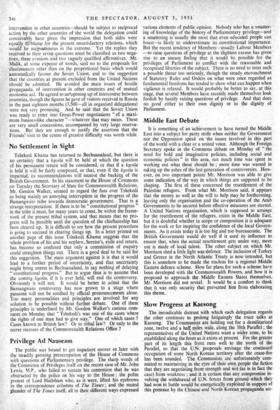No Settlement in Sight
Tshekedi Khama has returned to Bechuanaland, but there is no certainty that a kgotla will be held at which the question of his permanent return will be considered, or that if a kgotla is held it will be fairly composed, or that; even if the kgotla is impartial, its recommendations will receive the backing of the British Government. In his statement to the _House of Commons on Tuesday the Secretary of State for Commonwealth Relations, Mr. Gordon Walker, seemed to regard the fuss over Tshekedi as being mainly an annoying interruption in the progress of the Bamangwato tribe towards democratic government. That is a' strange interpretation'. If there is to be " constitutional progress " in the tribe it must, for many years to come, be within the frame- work of the present tribal system, and that means that no pro- gress will be possible until the question of the chieftainship has been cleared up. It is difficult to see how the present procedure is going to succeed in clearing things up. In a letter printed on another page of this issue Tshekedi Khama suggests that the whole problem of his and his nephew, Seretse's, exile and return, has become so confused that only a commission of enquiry could straighten things out. There is a good deal to be said for this suggestion. The main argument against it is that it would lead to a further period of uncertainty, and that uncertainty might bring unrest to Bechuanaland, to say nothing of delaying " constitutional progress." But to argue thus is to assume that the coming kgotla, if it is ever held, will end the controversy. Obviously it will not. It would be better to admit that the Bamangwato controversy has now grown to a stage where ons will not be soothed by official pronouncements alone. oo many personalities and principles are involved for any solution to be possible without further debate. One of these principles is underlined by Mr. Gordon Walker's curious com- ment on Monday that " Tshekedi's was one of the cases where the rights of one man had to give way." One of which cases ? Cases known to British law? Or to tribal law? Or only to the secret recesses of the Commonwealth Relations Office ?






























 Previous page
Previous page